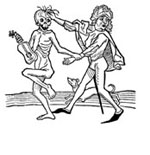
Teaching Men to Die to Teach Them to Live
FAITH & LOSS
I teach a university course on death. Enrollment is always robust. Even in our times, when we are so morbidly focused on the trivial, eternal matters have a way of imposing themselves — even when we are, as my students are, young enough to easily distract ourselves from them with just the slightest inclination to do so.
My syllabus for the course begins with this quote from Michel de Montaigne, one of the West’s greatest voices on matters of supreme existential import: “There is nothing I desire more to be informed of, than of the death of men: that is to say, what words, what countenance, and what face they show at their death…. Were I a composer of books, I would keep a register, commented of the diverse deaths, which in teaching men to die, should after teach them to live.”
I tell my students on the first day of class how compelling I find Montaigne’s point, and I go on to add that it is a fruitful practice even in situations in which we cannot know exactly what those dying said or did at their moment of death. For, in some cases, the bare facts of the lives of the individuals involved tell a profoundly moving moral tale about the ability to bear the supreme suffering of death and the reasons for the existence of that ability.
There is a collection of familial gravestones in my local cemetery in Lewisburg, Pennsylvania. In PowerPoint slides, I show my students photos I took of the markers on one or another of my innumerable walks in that cemetery. There are eight markers in all. They date from the start to the end of the 19th century, the first full century of the existence of the little town of 5,000 souls in which I live. They mark the graves of a father, a mother, and six of their children, each of whom preceded both mother and father in death.
You May Also Enjoy
The path of explaining -- let alone implementing -- Catholic wisdom as applied to societal matters is a long and complicated one. It helps to have authentic lay Catholics in high offices.
For Allen Tate, Caroline Gordon, and Walker Percy, neither tradition nor wealth-getting nor Protestantism answered the question of the meaning of existence. Their answer was in the Church.
With their old anti-Stalinism gone because of Stalin’s death, the anger of many New York intellectuals was turned against American society.

